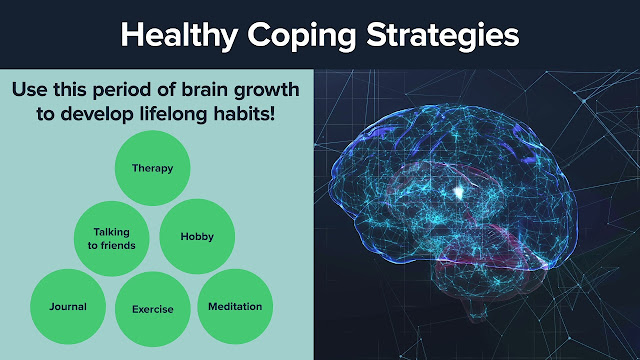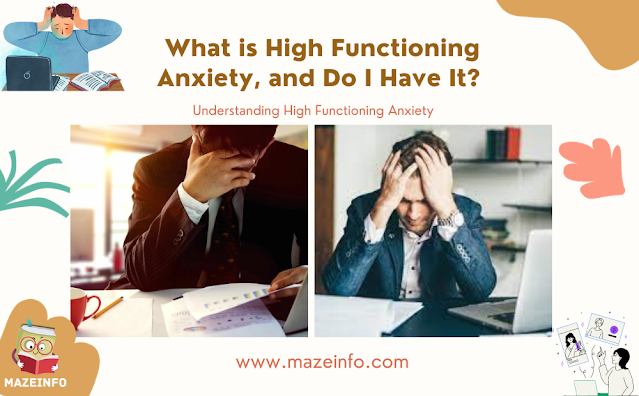In the hustle and bustle of modern life, anxiety has become a prevalent aspect of daily existence. High functioning anxiety is a subtle variant, lurking beneath achievements and success. This brief exploration aims to define and recognize the characteristics of high functioning anxiety, prompting the question: “What is High Functioning Anxiety, and Do I Have It?” Let’s unravel this hidden facet of mental health to foster self-awareness and guide potential support.
Understanding High Functioning Anxiety
High functioning anxiety test is a term used to describe individuals who experience symptoms of anxiety but are still able to maintain a high level of functionality in their daily lives. Unlike traditional stereotypes of anxiety, where individuals may be visibly distressed and have difficulty managing their responsibilities, those with high-functioning anxiety often appear successful and put-together on the outside.
Here are some key aspects to help understand high-functioning anxiety
Inward Struggle: Individuals with high-functioning anxiety often internalize their stress and worry. They may constantly feel on edge, experience racing thoughts, and have a persistent fear of failure or making mistakes.
Perfectionism: A strong desire for perfectionism is common among those with high-functioning anxiety. They may set unrealistically high standards for themselves and be overly self-critical, driving themselves to achieve more despite the toll it may take on their mental well-being.
Overthinking and Rumination: People with high-functioning anxiety tend to overthink situations and events, often playing out worst-case scenarios in their minds. They may engage in rumination, dwelling on past mistakes or worrying excessively about the future.
Physical Symptoms: While outwardly successful, individuals with high-functioning anxiety may experience physical symptoms such as headaches, muscle tension, stomachaches, and fatigue. These physical manifestations can contribute to the overall toll on their well-being.
Difficulty Relaxing: Relaxation can be challenging for those with functional anxiety treatment. Even during leisure time, they may find it difficult to switch off their racing thoughts and fully enjoy the present moment.
Fear of Failure: A pervasive fear of failure and a strong desire to meet high expectations, whether self-imposed or external, can drive individuals with high-functioning anxiety to work tirelessly. This fear can be a motivator but can also contribute to burnout and stress.
Hiding Symptoms: Individuals with functioning high anxiety may go to great lengths to hide their symptoms from others. They may fear being perceived as weak or incapable and, as a result, may not seek support or share their struggles.
Success Does Not Equal Happiness: Despite achieving success in various aspects of life, individuals with high-functioning anxiety may still struggle with a sense of fulfillment and happiness. The constant pressure they put on themselves can make it difficult to appreciate their accomplishments.
Characteristics of High-Functioning Anxiety
Perfectionism: Individuals with functional anxiety treatment often set extremely high standards for themselves and may fear making mistakes or falling short of expectations. This perfectionism can drive them to work exceptionally hard and achieve success, but it also contributes to heightened stress levels.
Overthinking and Worrying: People with high functioning anxiety treatment tend to overanalyze situations, anticipate potential problems, and worry excessively about the future. This constant mental chatter can be exhausting and may interfere with their ability to relax.
Difficulty Relaxing: Despite external success, individuals with high-functioning anxiety may find it challenging to unwind and relax. They may have a persistent sense of restlessness and a feeling that there is always something more to be done.
Physical Symptoms: signs of high anxiety can manifest in physical symptoms such as muscle tension, headaches, stomachaches, and difficulty sleeping. These symptoms may be the body’s response to chronic stress and tension.
Social Masking: Individuals with high-functioning anxiety often develop coping mechanisms that allow them to hide their internal struggles from others. They may appear calm, composed, and in control even when experiencing significant anxiety.
Differences from Other Forms of Anxiety
Outward Appearance: High-functioning anxiety is characterized by an outward appearance of competence and success, whereas other forms of anxiety may be more visibly distressing, leading to behaviors like avoidance, panic attacks, or impaired daily functioning.
Social Functioning: Despite experiencing anxiety, individuals with high-functioning anxiety may maintain their social and occupational roles effectively. In contrast, some other forms of anxiety disorders can significantly interfere with a person’s ability to function in these areas.
Recognition and Seeking Help: People with high-functioning anxiety may be less likely to recognize their anxiety or seek help because their achievements and external success can act as a mask for their internal struggles. Other forms of anxiety may be more overt and lead to earlier recognition and intervention.
Common Signs and Symptoms
High-functioning anxiety is marked by subtle signs such as perfectionism, constant worry, and a fear of failure. Individuals may excel outwardly but struggle internally with self-doubt and restlessness. Physical symptoms like muscle tension and headaches can also manifest. Recognizing these signs is essential for understanding and supporting those dealing with signs of high functioning anxiety.
Recognizing how these symptoms may manifest in daily life
High-functioning anxiety is characterized by outward success and competence despite internal worry and tension. In daily life, this may manifest as perfectionism and a constant need for reassurance, leading to potential burnout and a difficulty in enjoying personal achievements. Recognizing subtle signs is crucial for providing support to those dealing with high functioning anxiety test.
Impact on Daily Functioning

High-functioning anxiety, while not always outwardly apparent, can significantly impact an individual’s daily life. This form of anxiety is characterized by an ability to maintain a facade of normalcy while grappling with intense internal stress. Understanding its effects on various facets of daily functioning, such as work, relationships, and personal well-being, is crucial for fostering awareness and support.
Work Performance and Productivity
One of the primary areas where high-functioning anxiety manifests its impact is in the workplace. Despite maintaining a façade of competence, individuals with high-functioning anxiety may experience heightened levels of perfectionism, self-doubt, and an unrelenting fear of failure. This section explores how these factors influence work performance, productivity, and the overall professional experience.
Interpersonal Relationships
Navigating relationships can be challenging for those with high-functioning anxiety, as the constant need for external validation and the fear of being perceived as inadequate can strain connections. This section delves into the intricacies of how high functioning anxiety test affects friendships, romantic relationships, and family dynamics.
Personal Well-Being and Self-Care
While appearing composed on the outside, individuals grappling with high-functioning anxiety often neglect their own well-being. This section examines the toll that anxiety can take on personal health, the importance of self-care, and strategies for maintaining a healthy balance despite internal struggles.
Coping Mechanisms and Support
Understanding how dealing with high functioning anxiety impacts daily life is essential, but equally crucial is exploring coping mechanisms and seeking support. This section discusses effective strategies for managing anxiety, the role of therapy, and the significance of building a support network.
Understanding the challenges

High-functioning anxiety poses unique challenges in daily life. Unlike more apparent anxiety disorders, it may go unnoticed, complicating identification and treatment. This form of anxiety affects individuals emotionally and cognitively, warranting an exploration of its specific challenges in daily activities. Understanding these nuances is crucial for providing effective support.
Concealed Struggles in Daily Tasks
Individuals with high-functional medicine anxiety navigate daily activities while concealing the internal turmoil caused by incessant worry. Despite their apparent competence, the burden of constant mental strain affects their efficiency and well-being, making routine tasks more challenging than meets the eye.
Relentless Pursuit of Perfection
The pressure to excel in various aspects of life propels individuals with high-functioning anxiety into a perpetual quest for perfection. This relentless pursuit, fueled by a fear of failure, can create a cycle of overachievement that not only exhausts them mentally but also distorts their perception of success and accomplishment.
Social Hurdles and Isolation
While appearing sociable, those with high-functioning anxiety grapple with unique challenges in social interactions. The fear of judgment and the constant need for approval can lead to self-imposed isolation, hindering their ability to form genuine connections and fully participate in group activities.
Acknowledging the Significance of Mental Health

In the fast-paced and demanding world we live in, the importance of mental health cannot be overstated. mental disorder well-being is an integral aspect of overall health, influencing our emotions, thoughts, and behaviors. Recognizing the need for professional guidance in this realm is crucial for addressing mental health concerns effectively.
The Complex Nature of Mental Health Disorders
Mental health disorders encompass a wide range of conditions, each with its unique set of symptoms and challenges. Attempting to self-diagnose or relying solely on anecdotal information may lead to misconceptions and delayed intervention. Consulting mental health professionals becomes paramount to navigate the complexity of these disorders.
The Role of Mental Health Professionals in Diagnosis
Trained hypnotherapy for anxiety health professionals, such as psychiatrists, psychologists, and counselors, possess the expertise to conduct comprehensive assessments. Through evidence-based methods, they can evaluate symptoms, consider personal history, and rule out other potential causes. This diagnostic precision is instrumental in tailoring appropriate treatment plans.
Personalized Treatment Approaches
One size does not fit all in mental health issues treatment. Consulting professionals ensures that individuals receive personalized care based on their specific diagnosis and circumstances. This tailored approach increases the likelihood of successful outcomes and helps individuals regain control over their mental well-being.
Overcoming Stigma and Seeking Help
Unfortunately, societal stigma often surrounds mental health issues, hindering individuals from seeking the help they need. Emphasizing the role of mental disorder test health professionals in diagnosis serves to destigmatize seeking assistance, encouraging individuals to prioritize their mental health without fear of judgment.
Exploring potential treatment options, including therapy and medication
High-functioning anxiety involves individuals dealing with intense anxiety symptoms while outwardly appearing successful. This ability to conceal inner turmoil creates challenges in recognizing their struggles, leading to significant stress and impacting various aspects of their lives.
Therapeutic Approaches for High Functioning Anxiety
High-functioning anxiety often requires targeted therapeutic interventions to address underlying thought patterns and coping mechanisms. Cognitive-behavioral therapy (CBT) and mindfulness-based therapies stand out as effective options to help individuals manage anxiety symptoms and build resilience.
Medication Considerations for High Functioning Anxiety
In certain cases, medication can play a crucial role in alleviating the symptoms of high-functioning anxiety. Selective serotonin reuptake inhibitors (SSRIs) and benzodiazepines are common pharmacological interventions that may be prescribed. However, it is essential to carefully weigh the benefits and potential risks in consultation with a healthcare professional.
Also, Read More: How to Care for Newborn Rabbits?
Coping Strategies and Self-Care

High-functioning anxiety can be challenging to navigate, as individuals may appear composed on the surface while experiencing intense internal stress. coping with anxiety strategies and self-care play pivotal roles in managing this condition, allowing individuals to maintain mental well-being. This article explores practical tips for coping with high-functioning anxiety and emphasizes the crucial role of self-care in sustaining mental health.
Coping Strategies for High-Functioning Anxiety
Mindfulness Techniques: Engaging in mindfulness practices, such as deep breathing and meditation, can help individuals stay present and manage anxious thoughts.
Cognitive Behavioral Therapy (CBT): Learning CBT techniques assists in identifying and challenging negative thought patterns, fostering healthier perspectives.
Establishing Boundaries: Setting clear boundaries helps manage overwhelming commitments and reduces the risk of burnout, a common concern for those with high-functioning anxiety.
Progressive Exposure: Gradual exposure to anxiety-inducing situations can desensitize individuals, helping them build resilience over time.
Time Management: Organizing tasks and prioritizing responsibilities helps prevent feelings of being overwhelmed and promotes a sense of control.
The Role of Self-Care in Mental Well-Being
Physical Self-Care: Prioritizing regular exercise, adequate sleep, and proper nutrition contributes to overall well-being and helps regulate mood.
Emotional Self-Care: Acknowledging and expressing emotions, whether through journaling, talking to a friend, or seeking therapy, fosters emotional resilience.
Social Connection: Maintaining meaningful connections with others provides a support system and reduces feelings of isolation.
Hobbies and Creativity: Engaging in activities that bring joy and fulfillment can serve as a healthy distraction and contribute to a more balanced life.
Technology Detox: Taking breaks from digital devices and social media helps reduce information overload and promotes mental clarity.
Reflection and Self-Assessment
In the realm of high-functioning anxiety, self-reflection becomes a vital tool for unraveling its subtle complexities. Individuals navigating this internal turbulence often find themselves on a perpetual journey of self-assessment, seeking to understand the delicate balance between achievement and emotional well-being. Acknowledging and understanding the nuances of high-functioning anxiety through introspection can pave the way towards a more authentic and harmonious existence.
Conclusion
If you suspect you have high-functioning anxiety, it is crucial to prioritize your mental health issues and seek support. Consulting with a mental health professional can provide a better understanding of your experiences and help develop coping strategies. Recognizing and addressing high-functioning anxiety is a proactive step toward achieving a more balanced and fulfilling life. Remember that seeking help is a sign of strength, and there are effective interventions available to support you on your journey to mental well-being.
Frequently Asked Questions(FAQs)
Q: How is it Different from General Anxiety Disorder (GAD)?
Ans: High Functioning Anxiety differs from General Anxiety Disorder in that individuals with high functioning anxiety often excel in their responsibilities and maintain a high level of functionality, concealing their internal struggles more effectively.
Q: What are Common Signs of High Functioning Anxiety?
Ans: Signs may include perfectionism, overthinking, a constant need for reassurance, fear of failure, and difficulty relaxing. People with high functioning anxiety may also be highly sensitive to criticism and often seek validation.
Q: Can High Functioning Anxiety Impact Physical Health?
Ans: Yes, high functioning anxiety can manifest physically, leading to symptoms such as headaches, muscle tension, insomnia, and fatigue. Prolonged stress may contribute to more serious health issues.
Q: How Can I Determine if I Have High Functioning Anxiety?
Ans: Self-awareness is crucial. Reflect on your thought patterns, behaviors, and emotional responses. If you notice persistent worry and stress even in the absence of apparent challenges, it’s advisable to seek professional help for an accurate diagnosis.
Q: What Strategies Can Help Manage High Functioning Anxiety?
Ans: Effective strategies may include mindfulness, therapy, stress-reducing activities, setting realistic goals, and adopting a healthy work-life balance. Seeking support from friends, family, or a mental health professional can be beneficial in managing high functioning anxiety.



